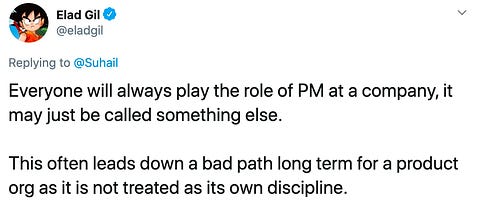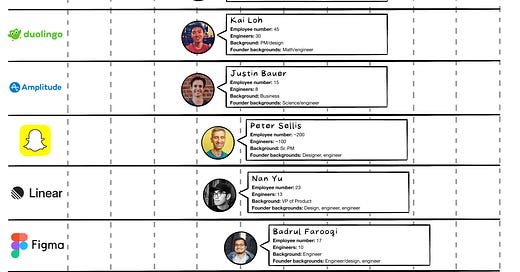When they hired their first PM
Lessons, timelines, and stories from Pinterest, Looker, Instagram, Segment, Snap, Notion, and 25+ other top companies
👋 Hey, I’m Lenny and welcome to a 🔒 subscriber-only edition 🔒 of my weekly newsletter. Each week I tackle reader questions about building product, driving growth, and accelerating your career.
P.S. Don’t miss Lennybot—my AI chatbot that’s trained on every newsletter post and podcast interview. It’s very good.
Q: When do companies typically hire their first product manager?
I reached out to 30 companies to find this out, and here you go:

Takeaways:
Everyone hires a product manager eventually.
The typical company waited two to three years to hire their first product manager. They typically had 10 to 15 engineers and 15 to 25 total employees. But the ranges are wide, so don’t use this as a hard-and-fast rule.
Surprisingly, more than half of companies hired their first PM before finding product-market fit, which is counter to the advice you hear. Particularly in B2B.
No founder told me they regretted bringing on a PM, but some companies, including Notion, shared that they regretted waiting so long. Though others, like Stripe, were happy they wanted so long.
Most first PMs were previously individual-contributor product managers, or senior PMs. Very few were previously former directors, VPs, or heads of product. Surprisingly, almost a fourth were engineers.
Interestingly, many companies with a strong product founder hired a PM very early. Coda and Snyk (who both had PM founders) hired their PM essentially as their first employee, and Slack (with Stewart Butterfield) just over a year in.
In terms of timing, there’s no one way to do it. Companies that hired a PM early did great (e.g. Snyk, Ramp, Slack), and companies that waited a long time (e.g. Stripe, Figma, Notion) did great.
Companies that waited a long time to hire their PM had different reasons to wait:
Notion spent much of that time (about three years) looking for product-market fit.
Stripe was building an engineering-oriented product and hired top-tier product-minded engineers, so they didn’t have a strong need for PMs.
Snap hired designers who took on the PM duties, which, from what I hear, ended up being fairly chaotic. They eventually hired a PM to lead their initial monetization efforts.
Companies that hired a PM early, like Ramp and Snyk, did so because they didn’t have the skills or time to do the product job well, and they knew their product would make or break the business. More on this below.
No matter how long you wait, whether you have a PM or not, someone will be doing the PM duties.

If you’re looking to push out your first PM hire, the questions you need to ask yourself are:



